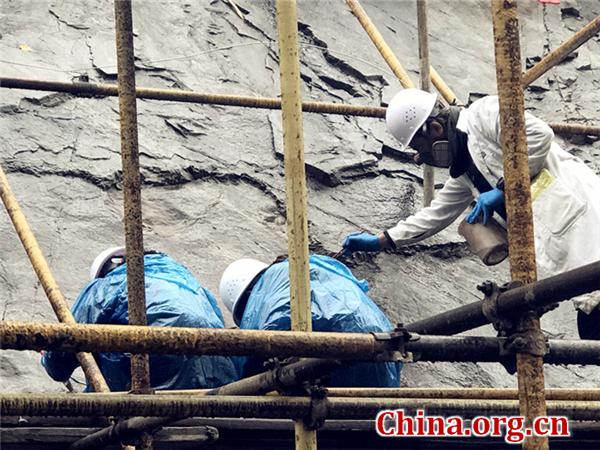Greek experts help preserve dinosaur footprints in Beijing
- By Guo Xiaohong
 0 Comment(s)
0 Comment(s) Print
Print E-mail China.org.cn, October 16, 2018
E-mail China.org.cn, October 16, 2018
A group of Greek experts have been working with their Chinese counterparts to preserve over 170 dinosaur footprints found in northwestern Beijing's Yanqing UNESCO Global Geopark, from Oct. 12 to 16.

"This is our second phase of work here," said Dr. Ilias Valiakos, UNESCO global geopark evaluator and vice director for Natural History Museum of the Lesvos Petrified Forest of Greece. He and his colleagues previously worked in Yanqing in May.
On that occasion, his team from the Natural History Museum of the Lesvos Petrified Forest of Greece started to clean the surface of the fossils on the slope and apply a special reagent to prevent weather damage, especially brought about by the rainy summer, and make them more visible to visitors.
"As we can see now, the methodology stood the rain test and proves effective," said Valiakos happily. This time, his team are completing the preservation work, during which they spotted several new dinosaur footprints on the 35-meter-high slope.
The footprints, first detected in Yanqing in 2011, are believed to have been left by dinosaurs living some 140 to 150 million years ago in the late Jurassic Period.
"Greece leads the world in fossil preservation and the exchange of knowhow and learning from their expertise help us improve our endeavor," said Zeng Guangge, a technical staff member in charge of preservation with the Yanqing geopark. "More importantly, we get to know and master the technology by working with these Greek experts, which is good for our future work as the preservation is an arduous, regular project."
Zeng said close cooperation and communication between the Yanqing and Lesvos UNESCO global geoparks had been enhanced since they signed an agreement in 2015 to include personnel training, people-to-people exchange and joint operation.
Besides guiding the field preservation, Valiakos had another job this time, of giving a lesson to local pupils in Yanqing on Oct. 15, to popularize geo-knowledge and explain the importance of protecting and conserving the dinosaur footprints and petrified plant fossils in their hometown.
"Only in this way can the geo-heritage be passed on from generation to generation," he said.
Valiakos and his team will visit Yanqing again next April to further promote the preservation project. "We will see what the treated-footprints will be like after the dry winter," he told China.org.cn.






Go to Forum >>0 Comment(s)